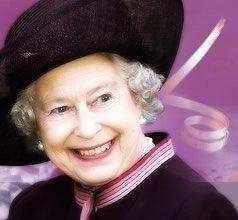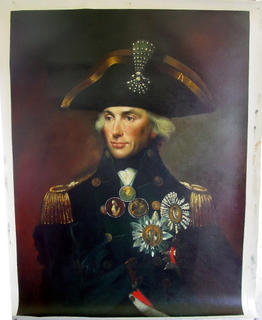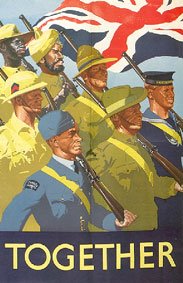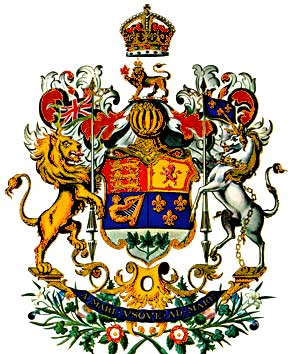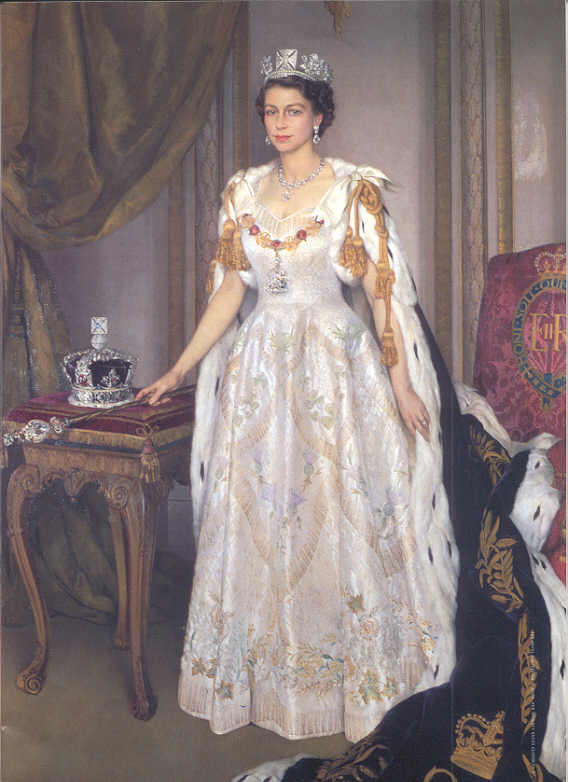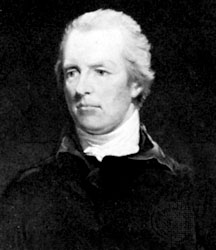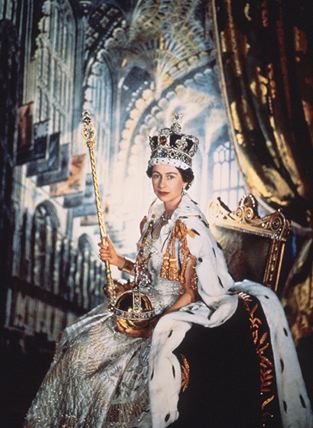[+] HONOURING OUR PATRON, SIR WINSTON CHURCHILL, VICTOR OF THE ENGLISH-SPEAKING PEOPLES
[+] HONOURING OUR QUEEN, ELIZABETH THE SECOND, ON THE 80TH YEAR OF HER BIRTH (1926 - 2006)
[+] HONOURING OUR KING, SAINT EDWARD THE CONFESSOR, ON THE 1000TH YEAR OF HIS BIRTH (1005 - 2005)
[+] HONOURING OUR HERO, LORD NELSON, ON THE BICENTENNIAL OF THE BATTLE OF TRAFALGAR (1805 - 2005)
[+] HONOURING OUR SONS, THE QUEEN'S COMMONWEALTH SOLDIERS KILLED IN THE 'WAR ON TERROR'
[+] HONOURING OUR VETS ON THE 150TH ANNIVERSARY OF THE VICTORIA CROSS (1856 - 2006)
Ordinarily I would quote a passage and provide a link, but the subscription firewall at the National Post is preventing me from doing this. Three days have now past since this column by Conrad Black was first published, which I hope is enough time to be now taking the liberty of providing the whole thing verbatim here for our Commonwealth readers who don't get the NP.
 Improbable though it may seem, the dowdy old Commonwealth could be a politically useful vehicle for Canada for collective political action.
Improbable though it may seem, the dowdy old Commonwealth could be a politically useful vehicle for Canada for collective political action.Canada does not wish to be subsumed into the United States, and resistance to such a fate has been the chief raison d’être of the country since a string of settlements along the U.S. border was first packaged together as a country in 1867.
Britain has clearly thought better of Euro-integration, to which Margaret Thatcher’s famous response – “No, no, no and never!” – has proved prophetic, though she was ejected largely by her own party for taking that position in 1990.
Australia and New Zealand are 7,000 miles from any countries with which they have much affinity, and the Australian attempt at immersion in Asia has been, to say the least, less than the sponsoring prime minister, Paul Keating, promised for it.
Vast India, the flourishing city state of Singapore and Malaysia, a middling nation in all relevant respects, are increasingly successful countries in search of international relationships with congenial and like-minded states, South Africa, by the standards of its region, is a Great Power, but would profit from association with some more advanced countries.
All these nations are in the Commonwealth, are essentially English-speaking, share the common law and are plausible democracies. Combined, their GDP is about US$4.5-trillion, with a strong growth rate. Even if India, especially, cannot be romanticized (its per capita annual income is only $728, corruption is rife and 100,000 farmers committed suicide in the last 10 years, the ultimate measurement of rural discontent), its potential and economic growth rates are impressive.
Great Britain has the world’s fourth highest GDP, Canada the seventh or eighth, India the ninth or tenth. Canada is rivaled only by Russia as the greatest treasure house of natural resources in the world, with Australia and South Africa not too far behind, and India is rivaled only be China as the world’s greatest economic growth prospect.
Complementary states no longer have to be geographically proximate to be usefully associated. Obviously, there could be no intimate association with the entire Commonwealth, which is infested with politically malignant and economically parlous states such as Zimbabwe, Mozambique, Gambia and Bangladesh. But a group composed of the most advanced and promising Commonwealth countries could be styled distinctively, let us say, the Association of Commonwealth States (ACS), and could adopt a custom-designed free trade agreement and a general political co-operation alliance – none of it infringing upon existing commitments of the U.K. to the EU, of Canada to NAFTA or of either country to NATO. The development policy priority, apart from the work needed to be done in member states (especially India and South Africa), would be in favour of less advantaged members of the old Commonwealth.
The British monarch could continue as sovereign of the United Kingdom, Head of the Commonwealth, and could be chief of state, or co-chief of state, of the countries that so desired, at present the old Dominions.
The quest for a united Europe has virtually collapsed. The overbearing Brussels bureaucracy is despised by everyone except the syndicate of European elites that dreams, especially in the smaller countries, of governing a continent.
All the participants of the EU value the relative civility of relations between their long-quarrelling countries, and the proportions of their trading zone. But it will not be possible to take Europe farther for a long time.
It is a notorious platitude that there is only one superpower in the world. Except for the Chinese and possibly the Indians, everyone defines themselves in contrast to the United States. Since neither the United States nor other countries wish federal union with the U.S., countries with innovative foreign policies will work across and between blocs to pursue alliances of common interest in historically different ways. Canada should take the lead in this.
An ACS would have the ability to reform the existing Commonwealth as a whole, and to trade concentrated development aid in retrograde Commonwealth regimes for improved domestic political structures and enhanced human rights. In exchange for increased development assistance, the more economically and politically primitive Commonwealth countries could also probably be induced to play a more constructive role in relaunching the UN.
While Canada would not be eligible to join the EU, we could seek associate status – as Switzerland, Norway, Iceland, Israel, Jordan and some South American countries already have. Because of Canada’s wealth, we would be eagerly embraced, and could then use our position to promote a two-tier Europe: political integration of those (if any) who want it, and lesser forms of co-operation for the rest.
This is what most British, and the majorities in many other EU countries, now seek. Again, the credibility gained from such a novel arrangement as the ACS, as well as Canada’s immense wealth and uncontroversial history as a country with no recent enemies, would enable us to play some discreet role even in European affairs (as Oxford’s Tim Garton Ash suggested in Toronto two weeks ago).
Canada should also explore the possibilities of some existing intra-Commonwealth institutions, such as joining the Australia-New Zealand economic association. These are all complicated, multilateral matters and nothing will be achieved without careful preparation. But Canada is, with China and India (albeit for very different reasons) the most swiftly rising power in the world. It has the capability of influencing the world positively, when most of the leaders of the traditionally leading countries lack energy and imagination.
A rapid escalation of Canada’s standing in the world will depend not only on the rise in value and demand of our resources, and the increase in our deployable military strength, but on our diplomatic originality – especially our ability to organize coalitions of countries seeking common and creditable objectives.
The Commonwealth is a venerable and underused institution, as much in need of reform and of a modern mission as the UN or NATO. Canada should offer it one. On this subject, it is fair, though not original, to ask ourselves: if not us, who; and if not now, when?


